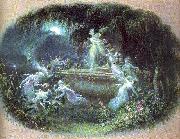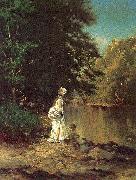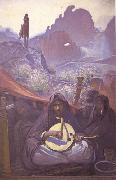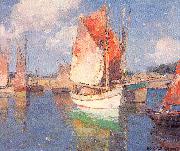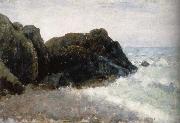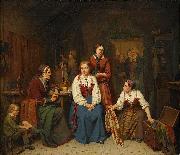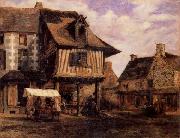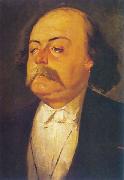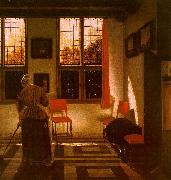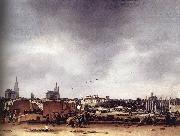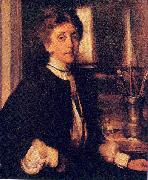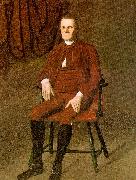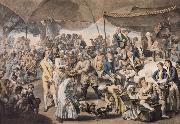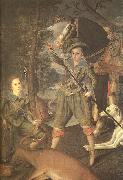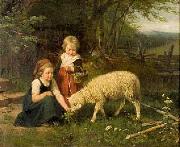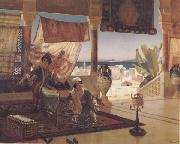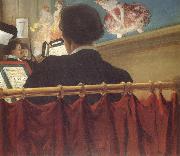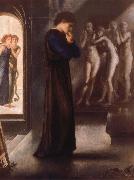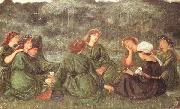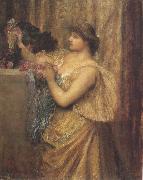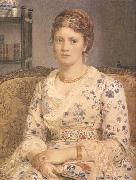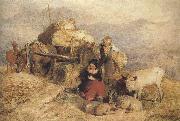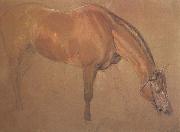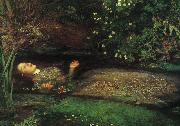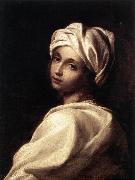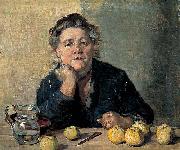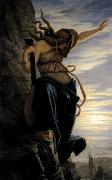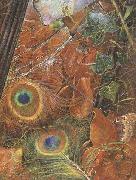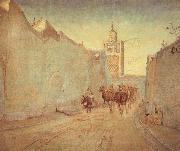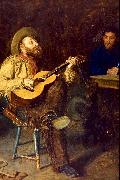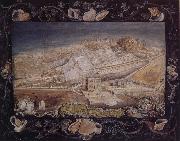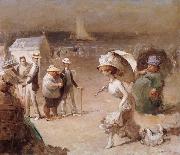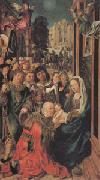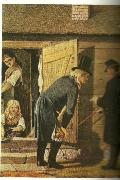|
|
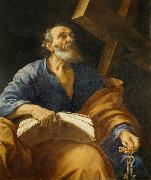 |
Paolo Emilio Besenzi
|
|
(1608-1656) was an Italian painter of the 17th century, born and active in Reggio. He trained with Francesco Albani. Friend and companion of Lionello Spada, he painted for the church of San Pietro. He was also known as sculptor and architect.
|
|
|
|
|
|
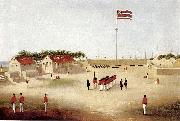 |
Paul Emmert
|
|
Paul Emmert (1826-1867) , who is also known as Paul Emert, was an artist born near Berne, Switzerland in 1826. By 1845, he had become an established artist in New York. He joined the gold rush to California in 1849. The following year he exhibited in Brooklyn a panorama of the gold mining activities before making his second trip to California late in 1850. While in California, he operated the Bear Hotel in Sacramento and exhibited the panorama in San Francisco and other communities. In 1853 he moved to Hawaii where he resided until his death in 1867 in Honolulu.
|
|
|
|
|
|
|
|
|
|
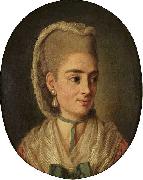 |
Per Krafft the Elder
|
|
(16 January 1724, Arboga - 7 November 1793, Stockholm) was a Swedish portraitist. He was the father of the artists Per Krafft the Younger and Wilhelmina Krafft.
|
|
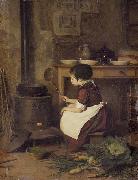 |
Pierre Edouard Frere
|
|
(1819-1886), French painter, studied under Hippolyte Delaroche, entered the cole des Beaux-Arts in 1836 and exhibited first at the Salon in 1843. The marked sentimental tendency of his art makes us wonder at John Ruskin's enthusiastic eulogy which finds in Frere's work the depth of William Wordsworth, the grace of Joshua Reynolds, and the holiness of Fra Angelico. What we can admire in his work is his accomplished craftsmanship and the intimacy and tender homeliness of his conception. Among his chief works are the two paintings, Going to School and Coming from School, The Little Glutton (his first exhibited picture) and L'Exercice (in the 19th century this work was in John Jacob Astor's collection). A journey to Egypt in 1860 resulted in a small series of Orientalist subjects, but the majority of Frere's paintings deal with the life of the kitchen, the workshop, the dwellings of the humble, and mainly with the pleasures and little troubles of the young, which the artist brings before us with humor and sympathy. He was one of the most popular painters of domestic genre in the middle of the 19th century. |
|
|
|
|
|
|
|
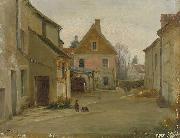 |
Pierre-edouard Frere
|
|
(1819 - 1886), French painter, studied under Hippolyte Delaroche, entered the e - ole des Beaux-Arts in 1836 and exhibited first at the Salon in 1843. The marked sentimental tendency of his art makes us wonder at John Ruskin's enthusiastic eulogy which finds in Frere's work the depth of William Wordsworth, the grace of Joshua Reynolds, and the holiness of Fra Angelico. What we can admire in his work is his accomplished craftsmanship and the intimacy and tender homeliness of his conception. Among his chief works are the two paintings, Going to School and Coming from School, The Little Glutton (his first exhibited picture) and L'Exercice (in the 19th century this work was in John Jacob Astor's collection). A journey to Egypt in 1860 resulted in a small series of Orientalist subjects, but the majority of Frere's paintings deal with the life of the kitchen, the workshop, the dwellings of the humble, and mainly with the pleasures and little troubles of the young, which the artist brings before us with humor and sympathy. He was one of the most popular painters of domestic genre in the middle of the 19th century.
|
|
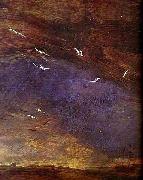 |
Pieter Bruegel the Elder
|
|
(Dutch pronunciation:c. 1525 - 9 September 1569) was a Flemish Renaissance painter and printmaker known for his landscapes and peasant scenes (Genre Painting). He is sometimes referred to as "Peasant Bruegel" to distinguish him from other members of the Brueghel dynasty, but is also the one generally meant when the context does not make clear which "Bruegel" is being referred to. From 1559 he dropped the 'h' from his name and started signing his paintings as Bruegel.
There are records that he was born in Breda, Netherlands, but it is uncertain whether the Dutch town of Breda or the Belgian town of Bree, called Breda in Latin, is meant. He was an apprentice of Pieter Coecke van Aelst, whose daughter Mayken he later married. He spent some time in France and Italy, and then went to Antwerp, where in 1551 he was accepted as a master in the painter's guild. He traveled to Italy soon after, and then returned to Antwerp before settling in Brussels permanently 10 years later. He received the nickname 'Peasant Bruegel' or 'Bruegel the Peasant' for his alleged practice of dressing up like a peasant in order to mingle at weddings and other celebrations, thereby gaining inspiration and authentic details for his genre paintings. He died in Brussels on 9 September 1569 and was buried in the Kapellekerk. He was the father of Pieter Brueghel the Younger and Jan Brueghel the Elder. Both became painters, but as they were very young children when their father died, it is believed neither received any training from him. |
|
|
|
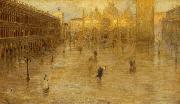 |
Pietro Fragiacomo
|
|
(Pirano deIstria (Trieste), 1856 - Venice, 1922) was an Italian painter.
Born at Pirano deIstria near Trieste, Fragiacomo moved with his family to Venice, where he enrolled at the Academy of Fine Arts in 1878 after a period as a worker in Treviso. He then abandoned his studies barely one year later to devote himself more freely to painting from life, often in the company of his friend the painter Giacomo Favretto. He won a bronze medal at the Universal Exhibition of 1889 in Paris and took part in the Munich International Exhibition of the same year, as well as later editions. Drawing inspiration from the Venetian lagoon and always characterised by a crepuscular sense of nature, his landscapes took on Symbolist overtones at the end of the century. He won the Prince Umberto Prize at the Milan Triennale of 1891 and was a regular participant from 1895 to 1922 at the Venice Biennale, which held a solo show of his work in 1910 and a posthumous retrospective in 1924.
|
|
|
|
|
|
|
|
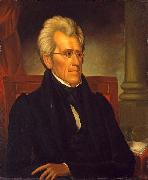 |
Ralph Eleaser Whiteside Earl
|
|
(1785-8 - Nashville, Tennessee, September 16, 1838), also known as Ralph E. W. Earl or Ralph Eleazer Whiteside Earl, was an American painter known as the "court painter" to President Andrew Jackson.
Earl was the son of portrait painter Ralph Earl and his second wife Ann Whiteside. He was born c. 1785-88, probably in New York City, and likely received his early training in portraiture from his father, whose naive style is reflected in the younger Earl's earliest works. He traveled to London in 1809, where he studied for a year with John Trumbull and was advised by Benjamin West, learning perspective, anatomy, and three-dimensional illusion. He remained in England until 1814, living with his maternal grandfather and uncle in Norwich and executing portrait commissions. He then traveled to Paris before returning to the United States in December 1815 with the intention of creating grand-scale history paintings on the European model.
As preparation for a planned project depicting the Battle of New Orleans, Earl met General Andrew Jackson and visited him at his Tennessee home, The Hermitage, in January 1817. Earl painted portraits of Jackson and his family, and married Mrs. Jackson's niece Jane Caffery on 19 May 1819. She died in childbirth in 1820. |
|
|
|
|
|
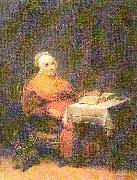 |
Robert Wilhelm Ekman
|
|
(August 13, 1808 - February 19, 1873), aka R. W. Ekman, was a significant teacher and painter of the Finnish romantic portraits and early national romanticism.
Robert Ekman was born in Uusikaupunki, Finland to an upper class family. His father was Karl Kristoffer Ekman, a medical doctor and a mayor. Mother was Sara Elisabet (maiden name Gadolin). Robert Ekman's both parents died when he was about 10 years old. They left behind five orphans who were placed in foster homes. Schooling was incomplete and there was no chance of academic education.
Robert Ekman first studied in Finland under the guidance of Gustaf Wilhelm Finnberg, but in 1824, with his brother Fredrubjm begun studies in Kungliga Akademien för de Fria Konsterna (The royal academy for free arts) in Stockholm. Already as a student Ekman specialized in portraying the life of the common people, instead of Classicism of the academic arts. Ekman graduated in 1836, and was granted a generous traveling scholarship for excelling in his studies. That supported him working in Holland, France and Italy between years 1837-1844. As the scholarship was not plausible otherwise, Ekman took the Swedish citizenship.
|
|
|
|
|
|
|
|
|
|
|
|
|
|
|
|
|
|
|
|
|
|
|
|
|
|
|
|
|
|
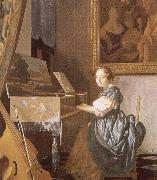 |
solomon eccles
|
|
also known as Solomon Eagle (1618 - 1683) was an English composer.
Little if any of his works are extant since, when he became a Quaker, he burned all his books and compositions so as to distance himself from church music. His repugnance for the organised church showed in his name for them: "steeple-houses".
|
|
|
|
|
|
|
|
|
|
|
|
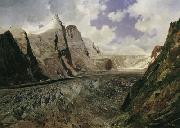 |
Thomas Ender
|
|
(3 November 1793 Vienna - 28 September 1875 Vienna) was an Austrian painter.
He was twin brother of Johann Ender. He also studied at the Vienna Academy, becoming a noted landscape painter. He won the grand prize at the Vienna Academy in 1816. Going to Brazil in 1817, he brought back nearly a thousand drawings and water colors. He visited Italy, Palestine, Greece and Paris. In 1836, he became corrector and later professor at the Vienna Academy, filling that chair until 1849.
|
|
|
|
|
|
|
|
 |
ulrika eleonora
|
|
Ulrika Eleonora d.y., född 23 januari 1688, död 24 november 1741, var regerande drottning av Sverige 1719-1720, dotter till Karl XI och Ulrika Eleonora av Danmark, syster till Karl XII samt kusin till August den starke, Fredrik IV av Danmark och Fredrik IV av Holstein-Gottorp.
Hon gifte sig 24 mars 1715 med Fredrik av Hessen, den blivande Fredrik I, men förblev barnlös.
Ulrika Eleonora föddes den 23 januari 1688 på Stockholms slott som dotter till kung Karl XI och Ulrika Eleonora d.ä. Under barndomen förbisågs hon av alla för sin äldre, livligare och mera begåvade syster Hedvig Sofia.
Så snart hon blivit giftasvuxen fick hon många friare, bland andra blivande Georg II av Storbritannien och arvprins Fredrik av Hessen-Kassel. Redan 1710 begärde denne hennes hand, men deras trolovning tillkännagavs inte förrän den 23 januari 1714. Bilägret firades den 24 mars 1715.
Under Karl XII:s vistelse utomlands var hon, efter Hedvig Sofias död (1708), den enda myndiga medlemmen av kungahuset inom riket om man borträknar hennes åldriga farmor (Hedvig Eleonora).
I slutet av 1712 eller början av 1713 hade Karl XII tankar om att göra sin syster Ulrika Eleonora till regent, men fullföljde inte denna plan. Det kungliga rådet däremot övertalade henne att bevista dess sammanträden för att i henne erhålla ett stöd. Första gången hon infann sig i rådet, 2 november 1713, beslöts också om sammankallande av en riksdag. Det s.k. rörelsepartiet vid denna riksdag ville att prinsessan i kungens frånvaro skulle göras till riksföreståndarinna "såsom närmaste arvinge till kronan och regementet". Detta förslag motarbetades av Arvid Horn och rådet, som fruktade att svårigheterna för en ändring av regeringssättet därigenom skulle ökas. Prinsessan visade emellertid ständerna stort intresse för landets angelägenheter. I sina brev till kungen uppmanade hon honom att återvända hem och varnade honom för möjliga följder av hans frånvaro. Med hans samtycke undertecknade hon under den följande tiden alla rådets skrivelser, utom dem som var ställda till honom, för i sin egenskap av vice regent var hon ett med kungen enligt dennes uppfattning. Mera sällan deltog hon i rådets förhandlingar. |
|
|
|
|








